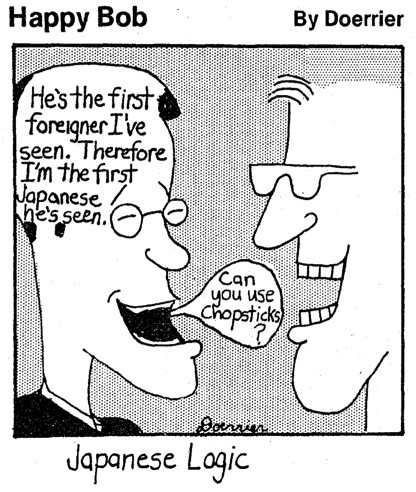March 1984: Ronald Reagan was U.S. president, Yasuhiro Nakasone Japan's prime minister. Afghan rebels were struggling to rid their country of foreign invaders (deja vu!). Break-dancing was a global craze. Tokyo Disneyland was so new it hadn't even been visited by Michael Jackson yet. Pay telephones were yellow or pink and couldn't dial overseas. I was in my first year at International Christian University in Tokyo, struggling with elementary kanji. And for a few brief magical weeks, Japan's foreign community was transfixed by "Happy Bob."
The creation of artist Mark Stephen Doerrier, Happy Bob was the title character of a single-panel cartoon whose brief life in The Japan Times stoked intense controversy. The first anti-Bob missive appeared in the letters column just two weeks after the cartoon's March 19 debut, wondering aloud why the paper had chosen to run the comic: "Do you actually think Doerrier's grotesque drawings, with their obvious anti-Japanese slant, are humorous?" Uh-oh.
The cartoon quickly disappeared, but not before generating a storm of such letters (and a few in support) until the editor declared correspondence on the subject closed on April 27. The last cartoon appeared the next day, showing an empty commuter train seat, captioned "Happy Bob missed his train today."

















With your current subscription plan you can comment on stories. However, before writing your first comment, please create a display name in the Profile section of your subscriber account page.